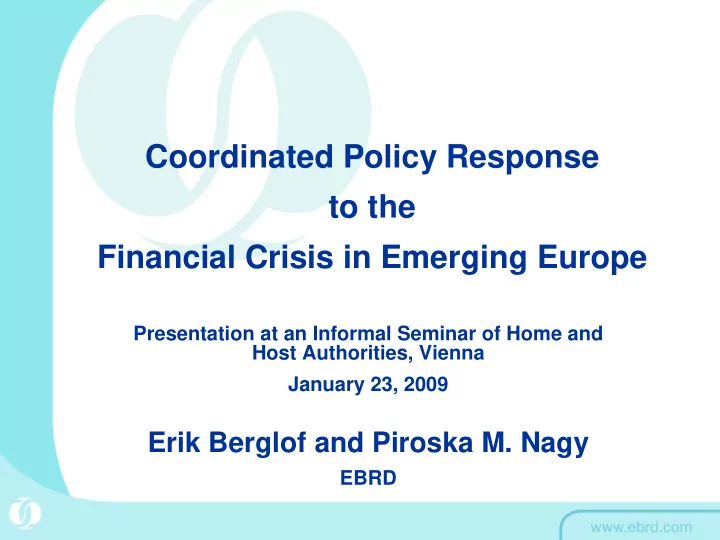

Coordinated Policy Response to the Financial Crisis in Emerging Europe Presentation at an Informal Seminar of Home and Host Authorities, Vienna January 23, 2009 Erik Berglof and Piroska M. Nagy EBRD
Outline � The severity of the problem � Need for stepped-up coordination in crisis and beyond � The proposal – a ”Vienna-Club” � Next steps
Facts � After remarkable resilience, Emerging Europe is engulfed by the global financial crisis � Liquidity shortages are acute both in local currency and foreign exchange � External debt refinancing needs are large in 2009, particularly for the private sector, with a significant part of it toward parent banks/companies � Recapitalization needs can be massive , as a back- of-the-envelope calculation indicates
Potential Cost of Bank Recapitalisation Emerging Europe All EBRD IFI Initiative countries hit * (CESE, Baltics)** NPL increase of 10% > $100 billion $43.5 billion (of total loans) Note : historic data indicates that the crisis peak level of NPL is much larger, on average 34%. At that level, the average fiscal cost of bank recapitalization was 14% of GDP in the period 1970-2007, with an estimated output loss of 19 % of GDP. *** * Excludes Czech R, Poland, Slovakia, Slovenia, most ETC countries ** See later *** Source: IMF, Systemic Banking Crises: New Database, WP/08/224
Need for Better Coordinated Response � Europe is well integrated, particularly in the financial sector – A handful of EU-based banks own much of the banking sectors in CESE and Baltics – EU banks have benefited from a growing young market with high returns � Yet much of the policy response to the financial crisis thus far has been along national lines both in home and host countries
Need for Better Coordinated Response � This is clearly suboptimal: – Home country packages restricted by residency, discriminating against host country activities – Potential free rider problem (no burden sharing arrangements) – Adverse spillovers
Need for Better Coordinated Response � Key stake holders have not coordinated their actions beyond national boundaries with international stakeholders either, such as IFIs committed to the region and bank groups � Yet no isolated action by any of the players can be sufficient, given the magnitude of the problem � In short, the issue is how to establish a regional public-private sector coordination mechanism ?
Proposal: a “Vienna Club” for European Banking Coordination? � Need for a flexible coordination framework that brings together the key stakeholders: home and host authorities, IFIs (IM, EBRD, EIB and IFC/World Bank), and parent banks � Objective : joint work aimed at addressing funding needs in a close coordinated manner to avoid “free riding” and destructive non- cooperative solutions.
Proposal: a “Vienna Club” for European Banking Coordination? � Advantages: – Help cooperative solutions to a shared problem – Catalyze funding – Strong signal to the market – International framework may help overcome restrictions imposed at the national level – IFIs can design their operations according to global coordinated assessments, playing on their complementarities in terms of geographical presence, and product availability (some can provide equity and debt, others only debt)
Principals of the “Vienna Club” � Equal footing – For cross- border banks. This regional initiative would be supplemented by efforts to support non-regional banks – For countries in the broad EU neighbourhood area � Institutions working according to their mandate and procurement etc principles (although harmonisation is needed) � Framework that can go beyond crisis management � perhaps a new form of private-public sector policy dialogue in a globalised world
Burden-sharing � Parent banks : key contributions expected in terms of maintained capital and funding commitments. � IFIs : complementary contributions in line with respective capacity to deliver. � Host governments : liquidity support, capital, deposit insurance coverage. Note: possible need for currency swaps in tandem with LC liquidity support � Home governments : follow up on national support packages implementation.
Funding of Needs (indicative) � EIB: EUR 5 billion of undrawn credit lines and EUR 2 billion of new commitments (2009) � World Bank Group: – IFC: USD 1.5 to 2 billion (2009-2010) – IBRD: USD 3 to 4 billion (2009-2011) – MIGA: USD 1.5 to 2.5 billion (2009-2010) � EBRD: part of the EUR 3 billion FI business plan for 2009 � Parent bank support to subsidiaries � Host and home country support
Tasks to perform � Assessing needs at country level: IMF, central banks � Assessing needs at bank group level: IFIs, in particular EBRD given its presence in the region � Elaboration of a country/bank group matrix � Design of financial support arrangements on a case-by-case basis, according to priorities based on banking sector vulnerabilities
Next Steps � Pin down operating principles between the three core IFIs (deadline: end of January 2009). � Bring together stakeholders: – Meeting of home and host countries authorities and IFIs in Vienna convened by the Austrian authorities: 23 January – Pilot project at bank group level: Raiffeisen International (EBRD-EIB-IFC) – Pilots at host country level: Romania and Ukraine.
Yes, we can…
Recommend
More recommend